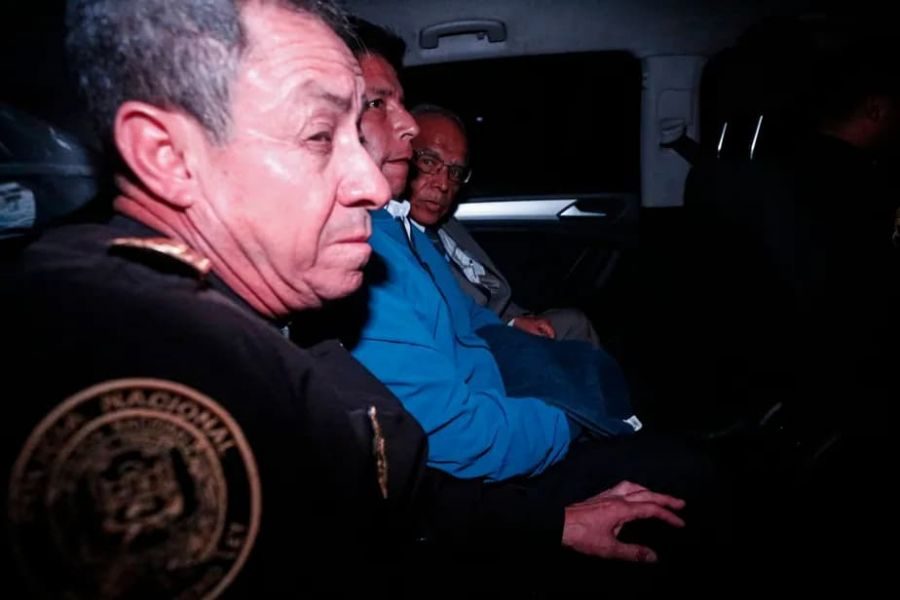AND – Peru: To save himself from being deposed, Pedro Castillo tries to stage a coup and is arrested
Ângelo de Carvalho
09 December 2022
Peru: To save himself from being deposed, Pedro Castillo tries to stage a coup and is arrested

Pedro Castillo (center) was arrested after an attempted coup. Photo: Renato Pajuello/Reproduction
On December 7, the counterrevolutionary rondero, until then reactionary president and sell-out, Pedro Castillo, was dismissed by the Peruvian parliament and detained by the country’s National Police after trying to shut down parliament and promote a coup. The arrest warrant came after Castillo dissolved Parliament on the day a session was scheduled to vote on his impeachment. The episodes take place at a time when Peru is going through the greatest crisis in its history, a concentrated expression of the general crisis of Peruvian society.
The country’s parliament had scheduled a session for 07/12 to vote on a vacancy order (a kind of impeachment) against the then president. Castillo, desperate to save himself, ordered a series of measures the same day: temporary dissolution of parliament, new elections for Congress, a curfew between 10 pm and 4 am local time, reorganization of the judicial system (from the Judiciary to the Public Ministry, the National Council of Justice and the Constitutional Court), the return of illegal weapons to the State and the establishment of an exceptional emergency government and a temporary emergency government. After the Castillo coup, the country’s constitution would be annulled and the emergency government would rule by decree law until a new parliament was elected and a new constituency established.
Moments after Castillo announced his actions, several ministers in Castillo’s reactionary, country-selling government announced their resignation from their posts. The “parliamentary counter-coup” had the participation of the two fractions of the reactionary ruling classes represented there and had the participation of the genocidal Armed Forces of Peru.
The country’s deputies, for their part, decided to advance the vote for Castillo’s dismissal and opted, by a large majority, for Castillo’s dismissal. The then president, in turn, tried to flee to the Mexican Embassy, where he would request asylum. On the way, the Peruvian PM issued an arrest warrant against Castillo and the National Police, complying with the order of the judiciary and the reactionary Armed Forces, arrested the former president. Vice President Dina Boluarte was in charge of assuming the government.
Castillo’s removal is the third attempt to remove the now former Peruvian president from office. In early November, Castillo, desperate to save himself from the political crisis, called for a mission from the Organization of American States (OAS) to save himself from the crisis and misery by handing over the country to Yankee (US) imperialism.
The events of 12/07 in Peru express the very serious political crisis of the old Peruvian State, which concentrates in itself several aspects of the general crisis that Peru is going through. According to a note released by the Peru Peoples Movement (MPP), the crisis also shows the relationship of collusion and struggle between the two factions of the big bourgeoisie (bureaucratic and comprador), a relationship that is now “expressed in the political struggle of the present, which has led to the replacement of the government of the counterrevolutionary Pedro Castillo Terrones, executioner of Chairman Gonzalo, erected as a representative of the big bureaucratic bourgeoisie in 2021, for these surprising things that have every society in final crisis, by the government of Dina Boluarte, who expresses, in the midst of the struggle, the collusion of the two reactionary factions, represented in parliament (that of the big comprador bourgeoisie and the big bureaucratic bourgeoisie)”.
Faced with the current struggle within the Peruvian reaction, the MPP affirms that everything leads to a greater reactionary action with the armed forces as protagonists: “All of this struggle what does it lead to, to a situation in which Castillo wants to close the parliament and the parliament wants to dismiss Castillo. Who is going to decide? The armed forces through the manifestation of their Joint Command. ”.
Regarding the new government, the Peruvian revolutionaries assure that it will be “captive of the armed forces and the majority parliament of the comprador faction” and that “it will once again be a weak government, with similar conditions and characteristics to the deposed one, doomed to fail in its three reactionary tasks: to restructure the State, to promote bureaucratic capitalism and to annihilate the people’s war. Therefore, the deep political crisis of the old State will continue to accentuate”.
And faced with the struggle of the popular masses, the MPP points out: “The masses become effervescent, all this under a weak government, failed like Castillo’s, which has not fulfilled, nor could it fulfill, its electoral promises. However, the situation does not change much for the reaction and its difficulties will increase. This is good for the revolution, it is good to advance in the task of the general reorganization of the Party in and for the People’s War”. And they conclude: “In situations like this, with a change of government, knowing that the new government will be much worse for the masses, it is necessary to mobilize them to fight for the defense of their rights, liberties and benefits won with blood, elevate them to the fight political, that is to say, to fulfill the pending task and to continue developing the revolution of new democracy with people’s war”.
